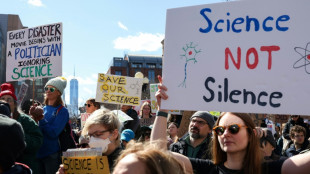
-
 Shai outguns Jokic with 40pts as Thunder roll past Nuggets
Shai outguns Jokic with 40pts as Thunder roll past Nuggets
-
Swiatek crushes Yastremska in pursuit of Indian Wells three-peat

-
 England's Lawrence out of Six Nations finale with Achilles injury
England's Lawrence out of Six Nations finale with Achilles injury
-
Real Madrid capitalise as Atletico stumble in Liga title race

-
 Syria vows accountability after reports of mass killings
Syria vows accountability after reports of mass killings
-
Arsenal title bid fades after Man Utd draw as Chelsea go fourth

-
 Arsenal held by Man Utd in latest blow to Premier League title bid
Arsenal held by Man Utd in latest blow to Premier League title bid
-
India's Rohit says 'not retiring' from ODIs

-
 Lakers star LeBron James to miss one to two weeks - report
Lakers star LeBron James to miss one to two weeks - report
-
After Poland spat, Musk vows Ukraine can keep Starlink

-
 'You think football is just PlayStation?': Maresca defends Chelsea
'You think football is just PlayStation?': Maresca defends Chelsea
-
Black comedy from award-winning 'Parasite' director tops N.America box office

-
 Seventh heaven for Ingebrigtsen as Mahuchikh and Bol also shine at Euro indoors
Seventh heaven for Ingebrigtsen as Mahuchikh and Bol also shine at Euro indoors
-
Spurs must show fighting spirit against Alkmaar: Postecoglou

-
 Syria announces probe after reports of mass killings
Syria announces probe after reports of mass killings
-
EU chief sees US as 'allies' despite 'differences'

-
 Street celebrations after India win Champions Trophy final
Street celebrations after India win Champions Trophy final
-
Israel halts Gaza electricity supply ahead of new truce talks

-
 Mbappe, Vinicius help Real Madrid shade Rayo Vallecano
Mbappe, Vinicius help Real Madrid shade Rayo Vallecano
-
Napoli refresh title hopes with win over Fiorentina

-
 Canada Liberal Party to choose new leader to replace Trudeau as PM
Canada Liberal Party to choose new leader to replace Trudeau as PM
-
England maintain Six Nations title hopes with Italy win

-
 Rohit and stingy spin attack lead India to Champions Trophy title
Rohit and stingy spin attack lead India to Champions Trophy title
-
Ingebrigtsen wins 3,000m for third Euro indoor double gold

-
 South Africa's taboo-breaking playwright Athol Fugard
South Africa's taboo-breaking playwright Athol Fugard
-
Chelsea go fourth as Spurs salvage Bournemouth draw

-
 Syria security forces disperse rival protests in Damascus
Syria security forces disperse rival protests in Damascus
-
Rubio heads to Saudi Arabia to gauge if Ukraine has shifted

-
 Trump declines to rule out 2025 US recession
Trump declines to rule out 2025 US recession
-
Tim Merlier sprints to victory in Paris-Nice first stage

-
 Getafe stun Atletico with Arambarri double
Getafe stun Atletico with Arambarri double
-
French research groups urged to welcome scientists fleeing US

-
 US envoy says Gaza hostage deal possible 'within weeks'
US envoy says Gaza hostage deal possible 'within weeks'
-
Journalist quits broadcaster after comparing French actions in Algeria to Nazi massacre

-
 'New challenge' for Dupont after announcing torn knee ligaments
'New challenge' for Dupont after announcing torn knee ligaments
-
Russia claims counter-offensive into Ukraine's Sumy region

-
 Casteels retires from Belgium duty over Courtois return
Casteels retires from Belgium duty over Courtois return
-
First World Cup win for Truppe in Are as Shiffrin breaks another record

-
 New Zealand reach 251-7 against India in Champions Trophy final
New Zealand reach 251-7 against India in Champions Trophy final
-
Highlights from Paris Women's Fashion Week

-
 Paris claims super-G in Kvitfjell as Odermatt edges closer to title
Paris claims super-G in Kvitfjell as Odermatt edges closer to title
-
Israeli air strike in Gaza ahead of new talks on truce with Hamas

-
 Ailing pope thanks doctors as condition improves
Ailing pope thanks doctors as condition improves
-
Dominik Paris claims the super-G in Kvitfjell

-
 Japan's Takeda equals course record in dominant China LPGA win
Japan's Takeda equals course record in dominant China LPGA win
-
US ends waiver for Iraq to buy Iranian electricity

-
 China-US trade war heats up with Beijing's tariffs to take effect
China-US trade war heats up with Beijing's tariffs to take effect
-
Garcia sends Ryder Cup message to captain Donald with LIV victory

-
 Israel to send team to Doha as Hamas pushes for phase two of Gaza truce
Israel to send team to Doha as Hamas pushes for phase two of Gaza truce
-
Art lovers mob Paris's Pompidou Centre ahead of five-year closure


Germany's Scholz seeks to build trust in Washington debut
Olaf Scholz makes his Washington debut as German chancellor on Monday, trying to dispel doubts over Berlin's resolve to stand up to Russia in the standoff over Ukraine.
As Scholz seeks to emerge from the long shadow of his veteran predecessor Angela Merkel, the new German leader will meet US President Joe Biden with several points of friction on the table.
While the US under Barack Obama relied heavily on Merkel's unique rapport with Russian President Vladimir Putin after Moscow's annexation of Crimea, Scholz has come under fire on both sides of the Atlantic for his vague stance in the current crisis.
Biden has taken pains to restore relations with Europe after the mutual recriminations of the Donald Trump years, but critics say Scholz has made that task more complicated.
Berlin's refusal to consent to shipping arms to Ukraine, its often muddled messaging on potential sanctions and above all its refusal to call off the Nord Stream 2 pipeline project to provide cheap Russian gas to Germany have all vexed Washington.
Analyst Constanze Stelzenmueller at the US think tank Brookings Institution said "contradictory statements" from Berlin on Russia had sparked "confusion, disappointment and harsh criticism" in Washington.
"Scholz's visit to Washington is an opportunity to fix his coalition's battered image," she told AFP.
- 'Lost their marbles' -
The chairwoman of the German parliament's defence affairs committee, Marie-Agnes Strack-Zimmermann, was even more alarmist about the young government's standing in Washington.
"In some quarters in the US there is the impression that the Germans have lost their marbles," she told AFP.
Scholz took office in December at the helm of a complex three-way coalition between his Social Democrats, the ecologist Greens and the pro-business Free Democrats.
They have turned in a shaky start faced with surging coronavirus infections and the looming prospect of a Russian invasion of Ukraine.
Scholz has often struggled with his messaging given divisions within the government and the influence of "Putinversteher" (Putin sympathisers) in his own party who tend to view Washington more suspiciously than Moscow.
The German coalition agreement sets out a "restrictive" arms export policy, arguing that sending weapons into conflict zones is more likely to fuel than resolve them.
But several European partners as well as the US administration have argued this leaves Ukraine particularly vulnerable as tens of thousands of Russian troops mass on its borders, and could tempt Putin rather than placate him.
- 'Stand up for security' -
Despite occasional rifts, close transatlantic ties have remained a cornerstone of German foreign policy since World War II.
It is for this reason that the sour tone with Washington has opened Scholz up to stinging rebukes.
Johann Wadephul, a leading MP with Merkel's Christian Democrats, told AFP he had received emails from colleagues in Washington "raising doubts about Germany's reliability".
John Kornblum, a former US ambassador to Germany, noted Berlin and Washington had long fostered different notions of stability.
"Germany is a country which does not like to take risks, it's a country which feels very uncomfortable if other people take risks," he told a Johns Hopkins foreign policy podcast recently.
On several major issues, he said, "Germany has in fact not been very much in line with its European partners for some time. And this Russia threat, the Putin strategy of course is the most dramatic."
On the thorny issue of Nord Stream 2, Scholz's language has evolved and he now concedes that the project would be axed should Russia invade.
However security experts on both sides of the Atlantic say Moscow's moves may be far less cut-and-dried than that and Scholz and Biden will have to discuss other red lines.
The German leader has also committed to diplomacy and will travel to Ukraine and Russia later this month after close consultations with European partners.
Michael Roth, head of the German parliament's foreign affairs committee and a close SPD ally of Scholz's, said he suspects that some criticism of Scholz is rooted in Republican efforts to "discredit" Biden's rapprochement drive.
"The most important thing is that we show President Biden that Europeans are willing to stand up for security, peace and stability in all of Europe," he told AFP.
H.Seidel--BTB
